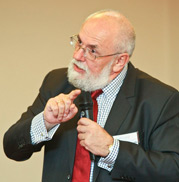 The Vilnius International Course owes its origins to efforts by the European Society of Paediatric Infectious Diseases (ESPID) to raise awareness of childhood diseases across the continent.
The Vilnius International Course owes its origins to efforts by the European Society of Paediatric Infectious Diseases (ESPID) to raise awareness of childhood diseases across the continent.
Dr Ron Dagan was ESPID President 10 years ago when the Society was looking for smart ways to raise standards of knowledge and practice by educating doctors. “That was where it all began for the Vilnius course. It has become one of the anchors [in Europe] driving interest in paediatric diseases,” he told Vaccines Today.
Now in its 7th year, and still endorsed by ESPID, the event has injected serious momentum into the field, resulting in stronger networks of experts and an increase in academic publications on childhood illnesses.
Delegates from 11 countries attended the conference this year, hearing presentations ranging from pneumococcal diseases and prudent use of antibiotics to vaccination acceptance. The number of attendees is kept below 100 in order to foster an intimate and interactive atmosphere.
Young audience
Vytautas Usonis of Vilnius University and the organiser of the course said the calibre of speakers and the fact that attendees are awarded continued medical education (CME) credits for participation have helped to attract doctors from across the region.
“Our main targets are health professionals from central and eastern European countries, primarily younger trainees,” he said.
With younger doctors often portrayed as being complacent about vaccine-preventable diseases, and medical schools facing criticism for offering minimal training in this area, working with the new generation of medics is essential if Europe is to defeat diseases such as measles and pertussis.
Lithuania itself has an exemplary record of childhood immunisation which has protected it from the measles outbreaks seen elsewhere in Europe. However, vaccination against influenza is a major weakness.
“Flu vaccination is really our big headache. We have created a life-span vaccination calendar covering not just children but the entire age spectrum. This, we hope, can help to improve uptake of vaccines against flu and other diseases,” said Prof Usonis.
‘Do as I do’
Dr Silvia Ferranti, a paediatrician from Milan, Italy, who attended the course, said paediatricians should lead by example and ensure that they have had the flu vaccine themselves. “It’s difficult to recommend vaccines if you don’t take your own advice. So we have to work on ourselves first,” she said.
Dr Ferranti said that in addition to maintaining medical knowledge and skills, doctors must develop their communication skills.
“We can develop the best vaccines but if people do not want these solutions then it is worthless,” she said.
This was a theme echoed in an informal session on communication of vaccination to parents and HCPs. Eugenijus Laurinaitis, an Associate Professor of Psychiatry at Vilnius University and incoming President of the European Association for Psychotherapy, emphasised the need for empathy in the doctor-patient relationship.
A clinician himself, he demonstrated how information must be tempered with empathy if it is to have an effect on a patients understanding and behavior. .
Dr Angus Thomson of Sanofi Pasteur and a member of the Vaccines Today Editorial Board said the challenge for vaccine advocates is to reach those who are “hesitant” about vaccination rather than obsessing about a very small minority who refuse vaccination altogether.
He concurred that information alone does not change behaviour. Decisions, he said, are made through a prism of emotions, values and worldview. Whilst some recent approaches to talking about vaccination suggest that health professionals respond differently to patients depending upon their attitude to vaccination, Dr Laurinaitis said we may be better to consider their broader health worldview as we have these important conversations.
Read more:
Are health professionals equipped to discuss vaccination?
Young doctors failing to champion immunisation
Vaccinology education can help fight infectious disease
Vaccinology courses: Filling a medical education gap
External:




